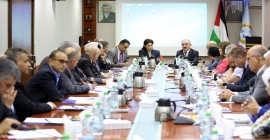The Government Plans to Treat the Unemployment Crisis
Translated by Sabrin Qadah
In the first session of the conference titled 'unemployment indicators and population 2030', Minister of Labour, Mamoun Abu Shahla, put up the statistics and the numbers that are well known to the audience, where there are 400 thousand unemployed in the West Bank, Gaza and Jerusalem, monthly income of the economy reaches up to 900 million shekels, expenses up to one billion and 150 million shekels with a deficit of between 200-250 million shekels covered by government loans and a sharp decline in international aid aiming to provide more political concessions.
The minister confirms that unemployment is caused by the occupation, and goes on by presenting statistics that indicate that there are 1,000,300 thousand citizens working in the governmental framework, 150-200 thousand people working inside the Green Line and the settlements, and the rest is 900 thousand people of which half of them work partially. The largest proportion of unemployed are of young graduates. He believes that this is due to and the fact that 80% of graduates have a humanitarian certificates, which markets do not require nor locally neither externally.
The government plans to treat these entrenched dilemmas in the Palestinian market is by several steps the ministry is working on towards making change. This includes especially the work on the preparation of an extraordinary budget to cope with new "is non-traditional" tasks of the Ministry of Labor, vocational training, rehabilitation of the unemployed for different training and teaching to cope with the domestic and foreign needs of the market, and the provision of small loans up to 15 thousand dollars each loan with an interest rate not exceeding 5% and a time limit of not less than one year.
He also listed the achievements of the government including the approval of the Social Security Fund, the operating system that will work after 3 months from now, the law on the organization of the union, which will be issued within two months, cooperation law as well as re-revision of the Labor Law.
In turn, Mustafa al-Khawaja the General Manager of surveillance and administrative records in the Palestinian Bureau of Statistics, expressed about the role of his position in reducing public space to provide details on all indicators, sectors and economic trends
The lecturer at al-Najah University and the Legal Economic Counsel Yousef Abdul Haq also had the opportunity to talk about his remarks on the Palestinian economic and social reality where he put his observations on the Sustainable Development of the United Nations plan, discussing the current unpromising indicators of the Palestinian economy in which the Palestinian average income per capita is lower than the average for 1994, and this is a serious indicator that puts us in either the form of development or decline experienced by the Palestinian economy, specifically the average income per capita.
He poured his anger on the current economic policy followed in Palestine, which is a free-market policy that "has failed" after 23 years of experience. He proposed to replace the current approach with a new approach called liberal development, and emphasized that there is no economic liberalization without political liberalization, and any new plans must aim at liberation not to live with the reality imposed by the occupation and its obstacles. Abdul Haq called for the need to get rid of monopolies and free market policies that have devoted funds to certain categories.
The representative of the United Nations Fund, Andres Thomson, presented a short film in which he reviewed the current population density in Palestine and how it will be during 2030 in relation to the availability of jobs, employment, GDP and so, arguing that reducing the population density is a necessity to avoid the consequences of a further decline of the Palestinian economy and per capita income.
The most important outcomes of this meeting was to reject the presence of the policies of monopoly and the absence of actual support important of national sectors such as agricultural sectors, the absence of effective protection of the local products, the government's call to encourage the employment of Palestinian funds employed abroad in the local economy, and other suggestions and observations built by attendees and discussants on the numbers raised about the declines in several frames of investment to decline in self-sufficiency.
The result according to participants is that the development goals will not be achieved and will continue to decline in the current situation, and that there is not any talks about a future vision for 2030 in light of repetition of plans and constrained by the occupation, that did not change anything in reality.





